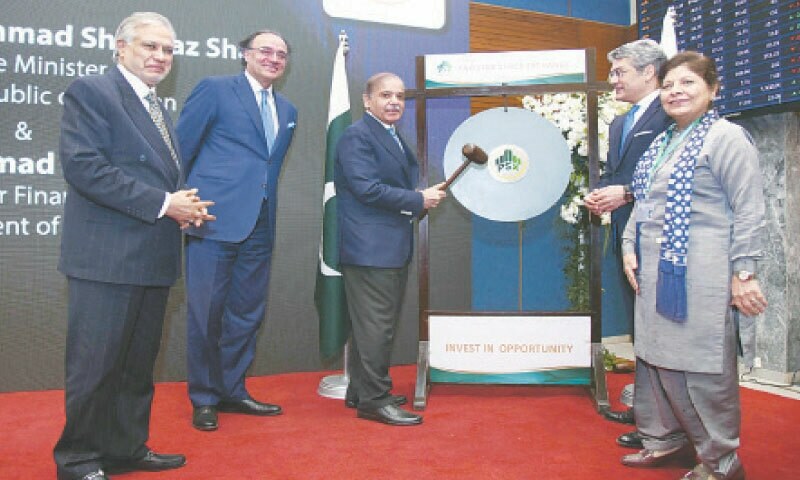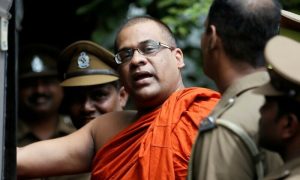• Promises transparency in privatisation of public sector entities
• Attends gong ceremony at PSX, highlights need to sustain momentum
• Opens faceless Customs system at port; launches clinical health manual at AKU
KARACHI: Highlighting the need for the integration of the entire economy via an e-governance system, Prime Minister Shehbaz Sharif said on Wednesday that Pakistan had attained favourable macroeconomic indicators, adding that it was incumbent upon government functionaries, investors, exporters, and all stakeholders to collaborate to strengthen it further.
In a whirlwind visit to the port city, the PM participated in the gong ceremony at the city’s bourse, inaugurated the Faceless Customs Assessment System at the South Asia Terminals at the Karachi port, and launched a clinical practice manual at the Aga Khan University (AKU).
Addressing a ceremony to mark the exceptional performance of the Pakistan Stock Exchange (PSX), he said that the government’s collective efforts has resulted in macro-level stability, which should now be converted into sustainable economic growth.
Felicitating the PSX for achieving tailwinds, the prime minister stressed the need to sustain the garnered momentum to attain economic growth through the prudent utilisation of the country’s natural resources, as well as the skills and expertise of experienced business and trade leaders.
He said the government would welcome tangible proposals and recommendations from the business community to actualise export-led growth.
He also noted that there was room to further decrease the interest rate, which had come down from 22pc to 13pc, but said that such a move must be made in a prudent and cautious manner.
PM Shehbaz highlighted the growth opportunities in agriculture, mining and mineral sectors, adding that the government wanted to utilise these natural resources to promote manufacturing and employment generation.
Referring to structural reforms in public sector entities, he said the government was committed to ensuring complete transparency in the privatisation of PIA and other organisations.
Speaking on the occasion, Finance Minister Muhammad Aurangzeb said the government was actively pursuing an agenda of decreasing inflation, supporting export-led growth and bringing reforms in tax, energy, public sector entities, pensions, civil service and other important sectors.
He also spoke about rightsizing initiatives aimed at improving service delivery and cutting down expenditures of the federal and provincial governments, saying that reforms were being implemented in a phased manner.
The finance minister also assured stakeholders that pre-budget consultations would begin the coming month so that proposals could be acquired and incorporated in the budget-making process.
Faceless customs system
Later in the day, the premier congratulated all stakeholders involved in the launch of the Faceless Customs Assessment System, saying that now the time required for goods declaration of any consignment would be between 10 and 20 minutes.
In just three weeks, the Bill of Entry (BOE) time has been reduced from 42 hours to 19 hours during the experimental phase of this project, he said, adding that the target was to achieve an average of 12 hours.
PM Shehbaz also announced a 10pc cash reward of the total recovery for Customs officials and staff who made additional recoveries, adding that a formula would soon be devised for this scheme.
He also suggested that Sindh Chief Minister Murad Ali Shah and Governor Kamran Khan Tessori, who were also in attendance, should conduct a third-party evaluation of the Faceless Customs Assessment project through IT experts.
Talking about bringing down electricity prices, PM Shehbaz said that until these rates come down to Rs15 to Rs20 per unit, agriculture and exports cannot develop, adding that he would also speak to the provinces in this regard.
Commitment to quality healthcare
Separately, addressing the launch of AKU Manual of Clinical Practice Guidelines, PM Shehbaz said the government was committed to ensuring optimum healthcare facilities to the people of Pakistan.
The launch coincided with an exclusive Healthcare Leadership Roundtable, held in collaboration with AKU. Led by the prime minister, the event convened 30 of the country’s most senior healthcare leaders, policymakers, and stakeholders for a high-level dialogue.
Speaking at the launch, the PM commended the legacy of the Aga Khan family towards supporting initiatives for the social and economic uplift of Pakistan.
He regretted that the country’s healthcare system was riddled with hurdles and challenges, such as limited access to quality care in rural areas, a shortage of skilled professionals, and the dual burden of communicable and non-communicable diseases.
Referring to his track record as Punjab chief minister, he recalled that during his tenure, world-class tertiary care hospitals like Sheikh Zayed were established and every district was equipped with advanced diagnostic tools such as MRI machines.
“Institutions of global standards and international prestige like AKU and Pakistan Kidney and Liver Institute give us hope, bridging the gap between the many challenges we face and solutions we need, and empowering our healthcare system to evolve and respond to the needs of every citizen,” he said.
Dr Adil Haider, dean of AKU’s Medical College and editor-in-chief of the manual, explained that the document was more than a guide. “With nearly 140 guidelines addressing 80pc of conditions seen in healthcare institutions in the country, this initiative is a giant leap toward ensuring every patient receives high-quality care,” he said.
Published in Dawn, January 9th, 2025







